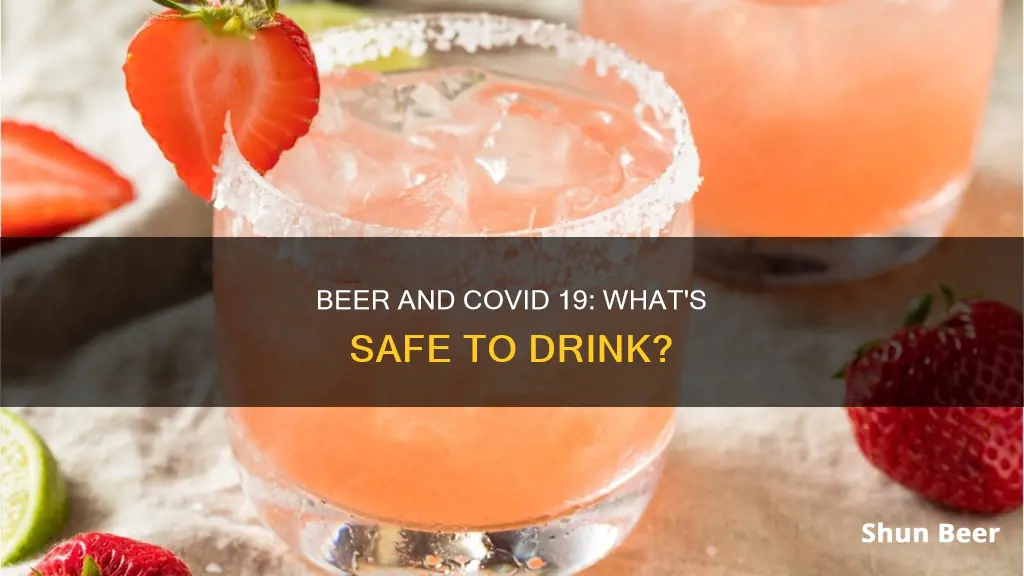
Drinking alcohol while undergoing treatment for COVID-19 is generally not recommended. Alcohol can weaken the immune system, making it harder for the body to fight off infections, including COVID-19. It can also cause dehydration, which can worsen COVID-19 symptoms and hinder recovery. Additionally, alcohol can impair the liver's ability to metabolize medications, potentially causing an overdose or worsening side effects. However, there is no conclusive evidence that alcohol affects the efficacy of COVID-19 vaccines or boosters. Nevertheless, some experts advise against drinking alcohol, especially heavily, immediately after receiving a vaccine or booster as it may worsen potential side effects such as fatigue, headache, and nausea.
| Characteristics | Values |
|---|---|
| Alcohol's effect on COVID-19 | Alcohol may worsen the effects of COVID-19 |
| Alcohol's effect on the immune system | Alcohol can weaken the immune system |
| Alcohol's effect on medication | Alcohol may interact with some medications for COVID-19 |
| Alcohol's effect on vaccination | There is no official advice to avoid alcohol before or after a COVID-19 vaccine or booster |
| Alcohol's effect on recovery | Alcohol may negatively impact recovery from exercise |
What You'll Learn

Beer is less hydrating than water
While there is no official guidance on drinking alcohol after getting a COVID-19 vaccine, some experts advise against drinking right after getting vaccinated. Research has shown that drinking alcohol may increase the risk of severe side effects from vaccines.
There is also no official guidance on drinking alcohol after getting a COVID-19 infection. However, it is generally advised to avoid drinking alcohol if you have COVID-19. This is because alcohol may damage your immune function, making it harder for your body to fight the infection and increasing the risk of complications. Alcohol can cause digestive upset, difficulty sleeping, trouble concentrating, and other unpleasant side effects that may worsen your COVID-19 symptoms.
Now, onto the topic of beer. Beer is less hydrating than water. It contains carbohydrates, which displace a small amount of water, and alcohol, which acts as a diuretic. Therefore, while a cold beer may seem like the perfect drink to reach for after an intense workout, it is not the best option for rehydration. This is especially true when compared to sports drinks, which contain carbohydrates and electrolytes to help maintain blood glucose levels, provide fuel for muscles, and decrease the risk of dehydration and hyponatremia.
So, while an ice-cold beer may be tempting, it is important to remember that it is less hydrating than water and may not be the best choice for rehydrating after a workout or if you are feeling unwell with COVID-19.
Antibiotics and Alcohol: A Risky Mix?
You may want to see also

Drinking alcohol after a COVID-19 vaccine is not advised by some experts
While there is no official guidance on drinking alcohol after receiving a COVID-19 vaccine, some experts advise against drinking right after vaccination. This is because hangover symptoms like fatigue, headache, and nausea may mimic or worsen the side effects of the vaccine.
According to Jagadeesh Reddy, MD, an infectious disease specialist:
> Though there is no data on this, it is advisable to abstain or reduce alcohol intake for the first 48-72 hours after vaccination. This is the usual period one might expect common and usually mild after-effects of vaccination, like fatigue, muscle aches, injection site pain.
Some research has found that drinking alcohol every day may increase the risk of severe side effects from the flu vaccine, so it may be best to avoid alcohol for a few days after receiving the COVID-19 vaccine.
Additionally, alcohol can affect the immune system, and excessive alcohol consumption increases susceptibility to immune-related conditions such as acute respiratory stress syndrome (wet lung). However, moderate alcohol consumption may enhance the response to classical vaccines, according to some studies.
In conclusion, while there is no official recommendation to avoid alcohol after a COVID-19 vaccine, it may be advisable to refrain from drinking for a few days to a few weeks after vaccination to avoid potential side effects and give your body time to recover.
Beer and Bypass Surgery: What You Need to Know
You may want to see also

Alcohol may worsen COVID-19 symptoms
While there is no official guidance on drinking alcohol after getting a COVID-19 vaccine or booster, some experts advise against drinking alcohol, especially heavily, immediately after receiving the vaccine or booster. This is because alcohol may worsen the side effects of the vaccine, such as fatigue, headache, and nausea.
Alcohol and the Immune System
It is well-accepted that alcohol consumption affects the immune response. Studies show that alcohol disrupts immune pathways and can impair the body's ability to defend itself against infection. Chronic heavy drinking has been shown to increase the risk of bacterial and viral infections.
Alcohol and COVID-19
Drinking alcohol, especially heavy drinking, may weaken the immune system, making it harder for the body to fight off COVID-19 and increasing the risk of complications. Alcohol can cause digestive upset, difficulty sleeping, trouble concentrating, and other unpleasant side effects that may worsen COVID-19 symptoms.
Alcohol and Medication Interactions
Alcohol may also interact with some medications used to treat COVID-19 symptoms. For example, mixing alcohol with fever reducers may cause bleeding, a rapid heartbeat, ulcers, and an upset stomach. Drinking alcohol while taking Tylenol (acetaminophen) may cause liver damage.
Risk of Acute Respiratory Distress Syndrome (ARDS)
Long-term, chronic alcohol use is associated with lung disease and can worsen COVID-19 symptoms. A 2021 study found that people who drink at least once a week are more likely to develop ARDS during COVID-19 hospitalization. This may be because alcohol weakens the immune system, making individuals more prone to infectious diseases.
Recommendations
If you do not have a physical dependency on alcohol and drink lightly or moderately, it is recommended to consider stopping alcohol consumption while having COVID-19. If you are physically dependent on alcohol or drink heavily, stopping drinking without medical supervision may be dangerous.
It is important to note that there is no conclusive evidence that alcohol affects the effectiveness of the COVID-19 vaccine or booster. However, some research suggests that people who drink excessive amounts or are immunocompromised may experience adverse effects if they drink alcohol when taking the vaccine.
Ice Fishing and Beer: What You Need to Know
You may want to see also

Drinking alcohol may weaken your immune system
Additionally, alcohol can have negative effects on both components of the immune system: the innate and the acquired. The innate immune system acts as a physical barrier to prevent harmful germs and parasites from entering the body, while the acquired immune system evolves throughout our lives to recognize and protect against specific diseases. Alcohol weakens both of these systems, making individuals more susceptible to infections and diseases.
It is important to note that the effects of alcohol on the immune system are complex, and more studies are needed to fully understand the impact of alcohol on immune function. However, it is clear that alcohol consumption, especially heavy and chronic drinking, can have detrimental effects on the body's ability to fight off infections and diseases. As such, it is advisable to avoid excessive alcohol consumption to maintain a healthy immune system.
The Fizziness in Beer: How Carbonation Works
You may want to see also

Alcohol may increase the risk of severe side effects from the flu vaccine
While there are no official guidelines, some experts advise against drinking alcohol after getting a COVID-19 vaccine or booster shot. This is because alcohol may worsen the side effects of the vaccine, such as fatigue, headache, and nausea. Research has also found that drinking alcohol every day may increase the risk of severe side effects from the flu vaccine. Therefore, it is recommended to avoid alcohol for a few days after vaccination.
The effects of alcohol consumption on the immune system are complex and paradoxical. While light-to-moderate drinking may improve the response to vaccination, chronic heavy drinking can increase the risk of bacterial and viral infections. Heavy drinking can also lead to long-term health issues, including an increased risk of cancer, particularly head and neck cancer, esophageal cancer, liver cancer, breast cancer, and colorectal cancer.
Additionally, alcohol can cause digestive upset, difficulty sleeping, and trouble with concentration, which may worsen COVID-19 symptoms. Alcohol can also increase the risk of developing acute respiratory distress syndrome (ARDS) during COVID-19 hospitalization. Therefore, it is generally recommended to avoid alcohol if you have COVID-19, especially if you do not have a physical dependency on alcohol.
It is important to note that people with active alcohol use disorder should not suddenly stop drinking without medical supervision, as alcohol withdrawal can be dangerous. If you are physically dependent on alcohol and want to stop drinking, it is advisable to seek medical advice and support.
Beer and Mucinex: Safe Mix or Health Risk?
You may want to see also
Frequently asked questions
Drinking alcohol may worsen the effects of Covid-19. Alcohol can cause digestive upset, difficulty sleeping, trouble concentrating, and other side effects that may worsen your symptoms. It can also weaken your immune system, making it harder for your body to fight off the virus.
There is no official advice to avoid drinking alcohol after the Covid-19 vaccine or booster. However, alcohol can affect the immune system, and excessive alcohol consumption may increase your risk of adverse effects.
Moderate drinking for females is one drink per day, and for males, it is two drinks per day.







